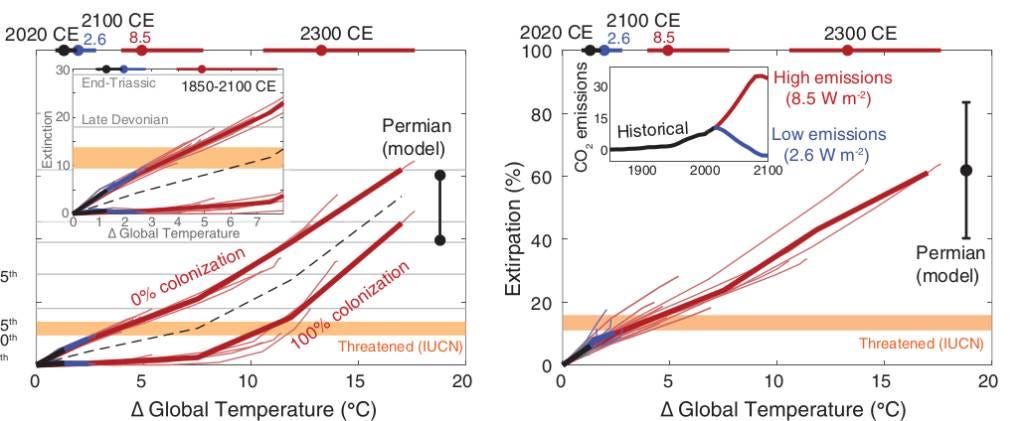Reporter Leslie Stahl once had herself filmed walking by a power plant's smokestack. She said, "There could be anything coming out of there." Unless "we" acted.
She asked her ardent followers to infer from that deep evidence that anything meant something bad. She jumped from could to does, and wanted us to, too.
We saw the same reasoning grip the political class pretty much the world over during the coronadoom panic. Experts like Nassim Taleb reasoned that anything could happen during the pandemic, therefore, he and they asked us to infer, something bad, far worse than we've see, would. Unless "we" acted.
Now we see this thinking again in the peer-reviewed paper "Avoiding ocean mass extinction from climate warming" in Science by Justin Penn and Curtis Deutsch, which begins with this sentence: "Global warming threatens marine biota with losses of unknown severity."
The title, as is now clear to you, shows the authors moved from unknown severity definite mass extinctions.
Saying a thing might happen gives no information about the thing other than it is not impossible. That, and nothing more. You cannot move from might to likely or certainly. You can't even infer unlikely. You are left in near total ignorance.
But to those of a precautionary mindset, might when applied to imagined terrors always implies damned certain. Unless "we" act.
It's good to keep this in mind as we emerge from the coronadoom panic, because the same people are still in charge, and precautionary habits aren't quelled easily. The most obvious regime-supported panic shift, given efforts at painting Putin as Hitler revivified are failing, is global warming.
Hence we see papers like ours today. Before we come to it, let's recall all models only say what they are told to say.
Our authors have created a model.
Now a lot of models take "data" and relate that data to measures using some kind of physio-probability model. For instance, we can collect a bunch of times species survived, and times when they didn't, and we can correlate those observations to measured changes in the weather. (That correlation becomes causation when wee p-values are seen. Magic does this.)
This model cannot be overly empirical, though, because there have been zero species killed by "climate change" recently, and none ever by man-caused slight increases in average temperature. Sure, man has aided in wiping out species in the past, but it wasn't because of small shifts in the weather.
On the other hand, changing weather, they say, axed the dinosaurs. So weather-caused extinctions can happen (if "they" are right). But, and it's a big but, those beasties died from the cold, Experts say. I'm open to correction, but of the "big 5" extinctions, when weather was a causal factor, it was an icy death grip. Not a hot one.
As we have lamented before, papers are increasingly hiding details in "supplementary" material. Same here. The paper resembles journalism; the meat is in the parts people won't read. So the quotes below come mostly from the Supplement.
Our authors start with a bunch of climate models (which are all by the same core set of Experts, so the multiple models provides a false sense of Diversity). Then they derive a metric called the "Metabolic Index" (MI).
The MI is a formula using oxygen and things like the sure-to-be-overcertain species-level "hypoxia tolerance" (one number per species). Then per species median body BMI, metabolic rest rates, and so on. They have several plug-in numbers for species across "five phyla (Annelida, Arthropoda, Chordata, Cnidaria, Mollusca)". Finally, this MI formula is tied to temperature.
Not surprising to us, but what should be surprising to the fearful, is that our authors spend a great deal of time on "cold tolerance limits" of species. Because it's cold that limits, not so much heat.
The model is an immense tangle of items: oxygen levels, how cold tolerance correlates to everything, "extinction thresholds" derived "Using Permian fossil data and simulations"---simulations are models, and all models etc.; wee p-values make an appearance---which in the end say that increasing heat will cause a mass extinction.
The model says a global average of 5 C increase will kill off somewhere between 1% and 20% of all species, with an emphasis on the higher levels.
Even bolder, by 2300---long after we've all met our final reward---the model says more than 60% of species will be whacked. By it becoming too cold because of global warming. Or something.
It'll be a problem to verify this model, not only because we'll all be dead when the observations come round. But we don't even know how many species there are, so it will be difficult to count percent loss.
Our authors also never adequately explain how if it is going to heat up because of CO2, and thus plants increase everywhere, and thus oxygen increases everywhere, how oxygen is ackshually going to decrease. Unless “we” act.
The whole thing is a mess, but a very scientific mess. So please join me in saying All models only say what they are told to say.
Buy my new book and learn to argue against the regime: Everything You Believe Is Wrong.
Visit wmbriggs.com.





Go with Bjorn Lomborg, there are multiple catastrophes we can weakly predict, but cannot decisively avert without a diversion of resources that is itself catastrophic. Or something to that effect.
All models only say what they are told to say.